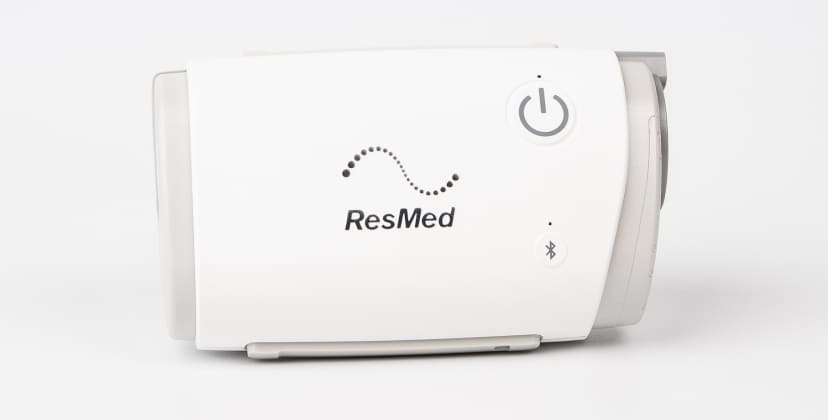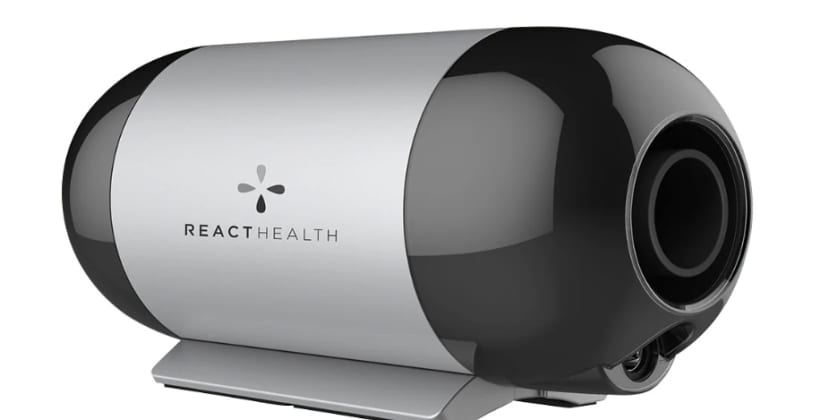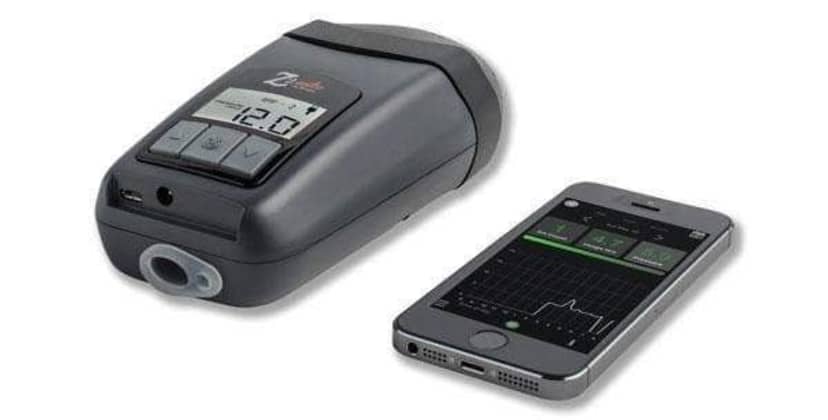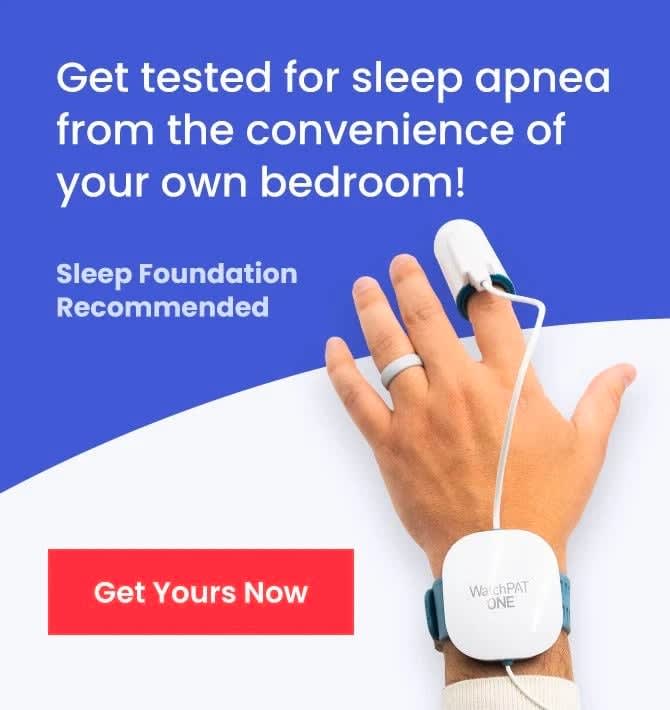When you buy through our links, we may earn a commission. Products or services may be offered by an affiliated entity. Learn more.
Best Travel CPAP Machines of 2026
Whether you’re flying across the country or heading out for a weekend camping trip, travel CPAP machines make it easier to maintain consistent sleep apnea therapy when you’re away from home. These portable devices tend to be smaller and often include features like waterless humidification, self-drying modes, and backup battery compatibility.
In this guide, we’ll run through our picks for the best travel CPAP machines, laying out their pros and cons and explaining which types of travelers could benefit from each. We’ll also discuss how to choose a travel CPAP device and share tips for traveling with a CPAP machine. And if you’re looking to learn more about standard CPAP therapy, check out our guide to the best CPAP machines.
Our Top Picks
-
Best Overall – ResMed AirMini
View Details
-
Best for High Pressure Settings – Luna TravelPAP
View Details
-
Best Lightweight – Transcend Micro Auto-CPAP Machine
View Details
Swipe for more
Best Overall
ResMed AirMini
Use this link for the most current ResMed discount
Use this link for the most current ResMed discount
With a small footprint and streamlined design, the ResMed AirMini is an optimal CPAP device for travel. It’s packed with plenty of features to benefit CPAP users without the bulk of a larger machine.

Price
$919
Level
29 dBA
Full Details
Weighing 10 ounces and with a small 20-watt AC power cord, the ResMed AirMini is a compact device that should easily fit into your travel bag. In addition to use on business trips and camping, this portable CPAP can be used on airplanes since it’s FAA-approved for in-flight use.
What Does It Do?
The device automatically adjusts pressure based on your breathing, which may be beneficial for those who haven’t had success with standard CPAP machines. The ResMed AirMini also features AutoRamp technology. This helps you fall asleep by starting at a lower pressure and then automatically increasing to your designated setting once you’ve fallen asleep. The ResMed AirMini app allows you to track your sleep data and monitor up to 30 days worth of data. The app also detects mask leaks, helping to ensure that you stay CPAP-compliant.
Who It’s Best For
With ActiveAir technology, the ResMed AirMini’s operating sound is 25 to 27 decibels, which is quieter than a whisper. Its design decreases the likeliness of disturbing others while traveling. The ResMed AirMini’s HumidX offers the same humidifying benefits as standard CPAP machines, such as preventing a sore throat or dry nose, but doesn’t require water. As such, there’s no need for additional parts. Vented air is achieved by attaching a quarter-sized piece of material to the mask’s tubing.
The ResMed AirMini is compatible with the AirFit P10 Nasal Pillow, the F20 Full Face Mask, or the F30 Full Face Mask. ResMed HumidX cartridges should be replaced every 30 days and are only compatible with the N20 nasal mask and P10 nasal pillow mask. The ResMed AirMini is not returnable once opened or used, but it’s backed by a 2-year manufacturer’s warranty.
Best for High Pressure Settings
Luna TravelPAP
Use this link for the most current React Health discount
Use this link for the most current React Health discount
Thanks to its auto-ramp feature, the Luna TravelPAP is ideal for frequent travelers who need high pressure levels during their CPAP therapy. The design is also small, light, and FAA-compliant for convenient in-flight use.

Price
$1,365
Level
29 dBA
Full Details
People who need high pressure levels for their CPAP therapy often struggle when going to bed, as the powerful air delivery can make it hard to relax before sleep. The Luna TravelPAP from React Health mitigates this issue with an auto-ramp feature that allows users to begin their therapy at a lower pressure setting, then gradually ease toward their prescribed pressure setting up to an hour after turning on their machine. The device also weighs less than a pound and measures just over 6 inches wide, making it relatively light and compact.
What Does It Do?
The Luna TravelPAP is a traditional CPAP machine, so pressure level is fixed for the duration of your therapy and the device does not adjust pressure for inhalations and exhalations. This may be a dealbreaker for some people who have used APAP machines and prefer the automatic adjustments. However, the TravelPAP is quite handy for travel because it’s small, lightweight, and FAA-compliant. There’s no humidification system, so you won’t need to drain the device or track down distilled water while you’re away from home, and it will adjust pressure to compensate for changes in altitude up to 7,500 feet.
Another notable aspect of the TravelPAP is the LightTrip Mobile App, which allows you to view advanced sleep data each morning. You can also use the app to access sleep coaching programs, set a maintenance schedule, and troubleshoot technical issues. This app is free to download and compatible with any iOS or Android mobile device.
Who It’s Best For
You can program the auto-ramp feature in five-minute increments up to one hour after your therapy starts. This makes the machine a great option if you’ve been prescribed a high pressure level but need extra time to acclimate to the machine as you fall asleep. The compact, FAA-compliant design is also great if you prefer to receive CPAP therapy during long flights.
People who prefer the flexibility of automatic CPAP machines may struggle with the Luna TravelPAP. The device doesn’t adjust pressure to align with your breathing, nor is it capable of providing expiratory pressure relief. That said, the machine is compatible with any face mask.
The Luna TravelPAP’s sticker price is somewhat high, but Sleep Doctor offers free ground shipping for all orders. You may return the device unopened within 60 nights of the delivery date.
Best Lightweight
Transcend Micro Auto-CPAP Machine
Use this link for the most current Somnetics discount
Use this link for the most current Somnetics discount
The Transcend Micro Auto-CPAP Machine is a high-performance CPAP machine with a host of features to help you sleep comfortably. The device is also exceptionally light and compact, making it a great option for frequent travelers.

Price
$999
Level
31 dBA
Full Details
Those who need to invest in a CPAP machine should expect to spend a decent amount of money on their purchase. While the Transcend Micro Auto-CPAP Machine isn’t exactly cheap, the device is more affordable than the vast majority of its competitors. Weighing less than half a pound and measuring less than 4 inches wide, the machine is also ideal for traveling — though it’s perfectly functional in your bedroom, as well.
What Does It Do?
The Transcend Micro Auto-CPAP can be programmed for pressure levels ranging from 4 to 20 cmH20. The machine will automatically adjust pressure delivery based on your breathing patterns, making it a good choice for people who need higher pressure when breathing in and lower pressure when exhaling. An auto-ramp feature gradually increases pressure levels as your therapy begins. You can also program the machine for “drying mode” to decrease condensation and minimize rainout, which can cause congestion. The device will function at altitudes up to 8,000 feet.
Who It’s Best For
The Micro Auto-CPAP lives up to its name as a CPAP machine suitable for therapy whether you’re in your bedroom or on the road. It’s lightweight and compact enough to fit in your luggage without taking up too much space and should work properly when you’re mid-flight. The automatic adjustment and ramp features are beneficial if you struggle with a fixed pressure setting. Those who frequently feel congested after CPAP therapy should also find relief thanks to the drying mode option.
The Transcend Micro Auto-CPAP qualifies for free shipping when you order from The Sleep Doctor. The device is backed by a 30-night trial period and a 2-year manufacturer’s warranty.
Best for CPAP or APAP Therapy
Breas Z2 Auto CPAP Machine
Use this link for the most current Breas discount
Use this link for the most current Breas discount
The Breas Z2 Auto CPAP Machine is a perfect choice for CPAP users seeking the convenience of a lightweight, stowable device. The Z2 Auto CPAP is an excellent travel-friendly option with a quiet motor that won’t disturb travel companions.

Price
$899
Level
26 dBA
Full Details
The Breas Z2 Auto CPAP Machine has a compact profile that makes it easy to transport and stow in luggage. The price point is noticeably lower than some other travel CPAP machines you’ll find on the market.
What Does It Do?
The machine offers auto-adjusting or fixed-pressure settings, so you can choose the option that feels most comfortable for your CPAP therapy. The Z-Breathe feature allows the machine to recognize your breathing pattern and reduce pressure accordingly upon exhalation. An auto start and stop feature enables the device to start delivering therapy once it detects that you’ve put on the mask and begun breathing. It automatically stops when you remove your mask or if it senses a leak.
Who It’s Best For
The Z2 Auto CPAP weighs 7.9 ounces and measures 6.3 inches long by 3.5 inches wide by 2 inches high, which is smaller and more lightweight compared to many other CPAP devices. Given its compact design, the machine is ideal for people who need CPAP therapy during travels. If you’re planning to travel off the grid, you can purchase an optional PowerShell, which provides 8 hours of therapy without the need for a power cord. The machine has a quiet motor, so it’s less likely to disturb you and those nearby. The device is also FAA-compliant for travelers who plan to bring it on a plane.
The Z2 Auto CPAP receives free shipping if you order through The Sleep Doctor. The machine is also backed by a 2-year manufacturer’s warranty.
Best Overall
ResMed AirMini
Use this link for the most current ResMed discount
Shop at Sleep DoctorThe gold standard for travel CPAP devices, thanks to a lightweight design, quiet output, and reliable performance.
See More Details

Best for High Pressure Settings
Luna TravelPAP
Use this link for the most current React Health discount
Shop at Sleep DoctorAn ideal CPAP device for travelers who need high pressure settings to address their sleep apnea symptoms.
See More Details

Best Lightweight
Transcend Micro Auto-CPAP Machine
Use this link for the most current Somnetics discount
Shop at Sleep DoctorA light and compact device for easy, convenient CPAP therapy when you’re away from home.
See More Details

Best for CPAP or APAP Therapy
Breas Z2 Auto CPAP Machine
Use this link for the most current Breas discount
Shop at Sleep DoctorA lightweight and FAA-compliant CPAP device you can toggle between CPAP or APAP therapy to meet your needs.
See More Details

How We Test
Our expert team of sleep care advocates and sleep product testing experts are dedicated to bringing you reliable and actionable product recommendations. We draw on decades of experience in the field of sleep health, and we personally research and evaluate the products discussed on our site.
Our picks for the best travel CPAP machines were developed after carefully analyzing the range of devices on the market and how their features line up with the needs of typical CPAP users. We also study verified reviews and evaluate each manufacturer’s reputation for product quality and customer service.
We also consider product recalls and warranties. Recalls are when a device is taken off the market because of a potential safety issue. Warranties provide a remedy if your device has defects in its materials or workmanship. Typical CPAP machine warranties expire after two years, but some last for up to five years.
Do You Really Need a Travel CPAP Machine?
A travel CPAP machine isn’t essential for everyone, but it can be extremely helpful if you travel frequently or need a lightweight, compact option for nights away from home. These devices are designed to maintain effective sleep apnea therapy while minimizing bulk, making them easier to pack in a suitcase or carry-on. Many models include conveniences such as waterless humidification, flexible power options, or FAA approval for in-flight use, which can simplify therapy during trips.
However, whether you need a travel CPAP depends on your lifestyle and preferences. If you only take occasional trips and don’t mind packing your standard CPAP, a travel model may not be necessary. Portable units also aren’t intended for long-term nightly use, and they shouldn’t replace a full-size machine designed for everyday therapy. They can be more expensive, may not be covered by insurance, and sometimes require proprietary accessories that add to the overall cost.
For people who prioritize portability, travel often, or want a backup device, a travel CPAP can be a worthwhile investment. But for others, continuing to use their regular CPAP while traveling may work just as well.
What Should You Look for in a Travel CPAP Machine?
There’s a lot to consider when buying a travel CPAP machine, ranging from features and usability to how the machine works with your other CPAP equipment.
Your doctor can help you find a travel CPAP machine that’s compatible with your personalized therapy settings. Once you purchase a machine, they can help troubleshoot any comfort issues that arise to ensure you continue to benefit from nightly therapy while on the road.
Machine Type
Many travel CPAP devices are equipped to provide both CPAP therapy and automatic positive airway pressure (APAP) therapy. Whereas standard fixed-pressure CPAP machines deliver air at the same pressure throughout the night, APAP devices use sensors and algorithms to adjust pressure levels based on breathing patterns.
Travel Constraints
When choosing a travel CPAP machine, consider the specific constraints you’ll face while on the move. Airline rules, luggage limitations, and the need for easy portability all play a role in determining which device is most practical.
Look for a machine that’s lightweight, compact enough to fit in a carry-on, and FAA-approved if you plan to use it on flights. If you often travel internationally or camp off-grid, you may also need flexible power options such as battery compatibility or universal voltage. A machine that fits your typical travel patterns will make it easier to stay consistent with therapy wherever you go.
Pressure Range and Noise Level
The standard pressure settings for most people prescribed CPAP or APAP therapy fall between 4 and 20 centimeters of water pressure (cm H2O), and most travel machines are equipped to handle this. The machine will be calibrated based on your prescription, either with a fixed CPAP pressure or a set range for APAP therapy.
As with a regular CPAP machine, you’ll want to look for a quiet device, especially if you’re staying in shared accommodations. Aim for a machine with a sound level of less than 30 decibels, which is about the same as a whisper.
Features and Technology
Most travel CPAP machines track data and display it in a smartphone app so that users can meet insurance requirements and monitor therapy progress.
Other optional features that are nice to have in a travel CPAP machine include pressure ramping and heated tubing. A pressure ramp makes it easier to fall asleep by starting therapy at a lower pressure and gradually increasing it as you drift off. Heated tubing helps prevent condensation from forming in the hose if you use a humidifier.
Recalls and Warranties
Most CPAP machines come with a warranty to protect consumers against manufacturing and workmanship defects. Read the terms carefully, because certain actions such as using an ozone cleaner may void the warranty. It’s also important to stay up to date on product recalls, which are issued when the manufacturer detects something potentially dangerous with the machine.
What Accessories Are Available for a Travel CPAP Machine?
Travel CPAP machines require many of the same accessories as regular CPAP machines, including a CPAP mask, tubing, and air filters. Many travelers prefer to use slim tubing, which is easier to pack. Be sure to verify mask and hose compatibility, as some travel machines require specific hose or mask models or additional fit kits.
You may also choose to purchase travel-specific accessories like external batteries and waterless humidifiers. Like other CPAP accessories, be sure to check compatibility with your machine before buying.
| Accessory | Description |
|---|---|
| External Batteries | External batteries are especially helpful when camping. Usually sold separately from the CPAP device, the most common type is rechargeable lithium-ion batteries, which are akin to a larger version of a smartphone battery. |
| Waterless Humidifiers | A standard CPAP humidifier with a water chamber is bulky and inconvenient to pack. That’s why most travel CPAP machines use a waterless humidification system, also known as a heat and moisture exchanger (HME). HMEs attach between the CPAP hose and mask and recycle the moisture from the user’s exhaled air into the air inhaled during the next breath. |
| Travel Bag | A dedicated travel bag for your CPAP machine can help you keep all the accessories together in one place. |
How Do You Buy a Travel CPAP Machine?
Buying a travel CPAP machine involves many of the same steps as purchasing a standard device, but with a few extra considerations to ensure it fits your travel needs. Before you begin, it’s important to understand your prescription requirements, compare features across models, and think about when and how you plan to use the machine.
CPAP Prescription
As with regular CPAP machines, you’ll need a prescription to purchase a travel CPAP machine. Your prescription should specify the type of device and pressure settings you require. If you’re unsure whether your current prescription is still valid or appropriate for a travel device, your sleep specialist or equipment supplier can guide you through the process.
Pricing and Insurance Coverage
The average cost of a portable CPAP machine ranges between $800 and $1,200, though you may be able to find some cheaper budget models. Machines with special features are usually priced higher.
Insurance coverage for travel CPAP machines depends on the carrier. If you already use your insurance for a regular CPAP machine, the plan might not cover a second one. For example, Medicare only covers the cost of a replacement CPAP machine if the first one is lost, stolen, damaged, or more than 5 years old.
Where to Buy a Travel CPAP Machine
You should only consider buying a travel CPAP machine through an authorized medical equipment provider. Fortunately, they’re widely available through online retailers, brick-and-mortar stores, and sleep clinics. Online stores generally offer a greater selection and lower prices. But if you prefer to see for yourself how big the machine is before buying it, you may prefer buying in person.
How Do You Travel With a CPAP Machine?
Traveling with a CPAP machine can look different depending on whether you’re flying, camping, or driving your RV. Many travelers find that it’s easiest to use a smaller CPAP machine and bring accessories such as a travel bag, CPAP wipes, portable batteries, and a waterless humidifier.
Although a travel CPAP machine is specifically designed for portability, there are different factors to consider depending on your mode of transport. You may find it helpful to make a list of everything you need to bring.
Flying With a CPAP Machine
In the U.S., a CPAP machine can be carried on an airplane and doesn’t count toward luggage allowance, as long as it’s packed in its own separate bag. Before you go, remember to empty your humidifier’s water chamber. You can bring distilled water in your checked baggage or in small bottles as part of your carry-on liquids allowance. Lithium batteries must be packed in your carry-on baggage.
You’ll need to take the CPAP machine out of the bag to put it through the X-ray scanners at security, but you’re allowed to place it in a clear plastic bag to keep it clean. We recommend bringing your prescription or a doctor’s note to show to the security staff if needed.
To use your CPAP machine during the flight, you’ll need to provide a certificate stating that it has been approved for in-flight use by the Federal Aviation Administration (FAA). Some airlines may request that you inform them several days prior to the flight. Air travel compliance documentation may be available for download on the machine manufacturer’s website.
Check the user guide to make sure it’s OK to plug the machine into the plane’s power port. Avoid using the humidifier, as the water can spill during turbulence.
For international travel, remember to check if your CPAP machine works in other countries and bring an adapter or a converter if necessary. Keep a copy of your prescription on hand in case you need replacement parts while abroad.
Camping With a CPAP Machine
If you plan to bring your CPAP machine on a camping trip, it’s important to ensure that you have uninterrupted access to a power supply. While some campsites have electrical hookups, you may need an inverter or a converter depending on the power source. If your campground doesn’t have electrical outlets or you plan on backpacking off the grid, a portable battery pack can help power your CPAP device on days when you don’t have access to electricity.
Hikers should check their CPAP machine’s user guide for the maximum operating altitude. Most machines work well up to 8,500 feet above sea level, but they may require special adjustments after that.
Cleaning and Care
Cleaning a portable CPAP machine is similar to cleaning a regular CPAP machine. However, if you’re using your CPAP machine while on a plane or when camping, you may need to pack CPAP wipes, distilled water, or other cleaning supplies.
With the machine unplugged, take it apart and remove the waterless humidifier and sound muffler, if applicable. Clean the mask and tubing connector daily using warm water, mild soap, and a soft brush. Once a week, wipe down the machine and soak and clean the tubing. Always rinse and air dry all the parts before reassembling.
Waterless humidifiers and disposable filters should not be washed. Instead, they need to be replaced on a regular basis. You should also replace any parts that are cracked or otherwise damaged. Always check the user guide for instructions specific to your machine.
Dive Deeper: In-Depth CPAP Guides
If you’re looking for additional CPAP supplies besides a travel machine, look no further. Our team broke down the best CPAP products into a series of convenient guides.

Still have questions? Ask our community!
Join our Sleep Care Community — a trusted hub of sleep health professionals, product specialists, and people just like you. Whether you need expert sleep advice for your insomnia or you’re searching for the perfect mattress, we’ve got you covered. Get personalized guidance from the experts who know sleep best.


